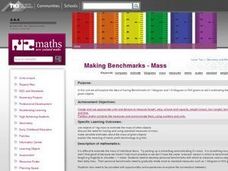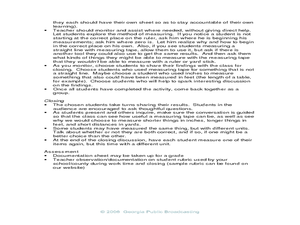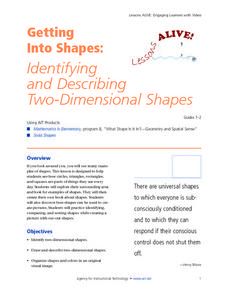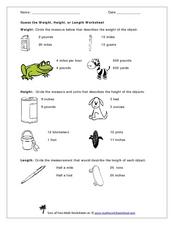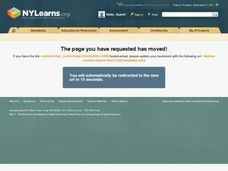Illustrative Mathematics
Tax and Tip
Finding out how to calculate tax and tip is a valuable skill that all young adults should be able to do without a calculator. Learners are given a bill and asked to calculate the tax, tip, and total amount. Calculations can be exact or...
Curated OER
Teddy Bears and Friends
Children begin by making direct comparisons between objects and putting a number of objects into order according to length. They are also introduced to measuring with multi-link cubes which allows them to compare objects which cannot be...
Curated OER
Estimation & Central Tendency
Eighth graders view pictures that show many objects, estimate amount that they think they saw, and take class data from estimation to find the mean, median, mode, and range for the class.
Curated OER
Finding Circumference and Area of a Circle
Young geometers explore the concept of circumference and area of circles. They discuss what information is needed to find circumference and area. The resource employs several instructional methods: Frayer Model for Vocabulary, literature...
Curated OER
Making Benchmarks - Mass
Elementary schoolers predict the mass for different objects. Then, using objects of 1kg mass, they make a more precise prediction. Afterwards, they discuss the need for having and using standard measures of mass.
Curated OER
Measurement Masterpiece
Here is a good, cross-curricular measurement and estimation lesson. Learners practice measuring paper strips to create an art project. This is a great way to introduce the ruler, and how it used, to your students.
Curated OER
Operations with Fractions and Decimals
Complete a lesson that introduces and explores operations with fractions and decimals. Pupils estimate the reasonableness of a decimal computation. Then discuss what operation is needed to find an answer. Handouts, web sources, and other...
Curated OER
Standard Units of Measure
Learners explore linear measurement. They choose appropriate measuring tools, measure three classroom items, and record their results. A class discussion ensues in which everyone decides the best way to present their data.
Curated OER
Getting Into Shapes: Identifying and Describing Two-Dimensional Shapes
Young scholars examine their classroom to find examples of various types of shapes. After identifying and describing the various shapes, they draw as many as they can on a piece of paper. They organize them into an image based on their...
Intel
Metric Madness
Scholars learn about the metric system and produce a presentation on how to convert within the metric system. They then develop a brochure in support of legislation requiring the use of the metric system.
Curated OER
Connecting Formulas Related to Geometric Figures
Students identify diagrams of quadrilaterals and circles by different names and classify the figures. They name the areas for each diagram and practice solving the formulas for each.
Curated OER
Frost Depth Study
Students complete activities to study the frost and frost depth. In this frost study lesson plan, students use frost tubes to study and measure the frost at their school. Students measure the frost in the tube and enter their data online...
Curated OER
Guess the Weight, Height, or Length Worksheet
Kids can estimate weight, length, and height. Here, they circle the measurement that best describes the length, height, or weight of 10 different objects.
Curated OER
Water Wonders
Students measure the amount of surface tension using a balance scale after a classroom demonstration students diagram the appearance of several liquids and label them.
Curated OER
Ready for Roots
Fourth graders sort seeds and predict what conditions are needed for them to germinate. They keep the seeds moist, observe and measure their growth and graph the results. As the seeds start to grow students compare and contrast the each...
Curated OER
Altitude Tracking
Students estimate the altitude of a rocket during several flights. They create their own altitude tracking devise. They examine and discuss their results at the end of the activity.
Curated OER
Investigation - Snack TIme
Students explore solving addition and subtraction problems. They solve real life problems. Students participate in a simulation activity to find the missing addend. They demonstrate adding and subtracting whole numbers.
Curated OER
Telling Time as an Everyday Use of Numbers
How can we estimate time? Have your young mathematicians make a clock. Then they compare and contrast types of clocks. They practice writing times in two different ways and make a book about telling time.
Curated OER
Vectors: How Much Force Can You Apply
This instructional activity entails the viewing of two videos to get an overview of force and its application. The instructional activity covers how vectors use force in real-world situations.
Curated OER
Confidence Intervals: Population Mean; Population standard Deviation Known
In this confidence interval worksheet, students examine a given confidence level and sample data to determine the margin of error, identify a confidence interval, list the mean and give the standard deviation. Students complete seven...
Curated OER
Checking Addition and Subtraction by Estimation
In this mathematics worksheet, students solve various equations using different methods. They estimate each answer by checking the additions and subtractions given for each. Then, students write in the decision column wither definitely...
Curated OER
What is the Average Height of Your Class?
In this statistics lesson plan, learners use an on-line form generator create a class-specific form, then complete the form, view a graph and data analysis, and draw conclusions.
Curated OER
Calories in a sports drink
How much can a company round numbers without being misleading? Learners investigate the accuracy of claims made by a sports drink company. Teachers could easily modify the activity by bringing in their own beverage bottles, or by taking...
Illustrative Mathematics
Why Randomize?
Your statisticians draw several samplings from the same data set, some randomized and some not, and consider the distribution of the sample means of the two different types of samplings. The exercise demonstrates that non-random samples...
Other popular searches
- Math Rounding Numbers
- Math Rounding Decimals
- Math Rounding and Estimation
- Math Rounding Off
- Math Rounding Numbers
- 3rd Grade Math Rounding
- Math Rounding to Tens
- Boring Math Lessons Rounding
- Rounding 4th Grade Math
- Decimal Rounding Math
- Rounding Math
- Brain Pop Math Rounding






